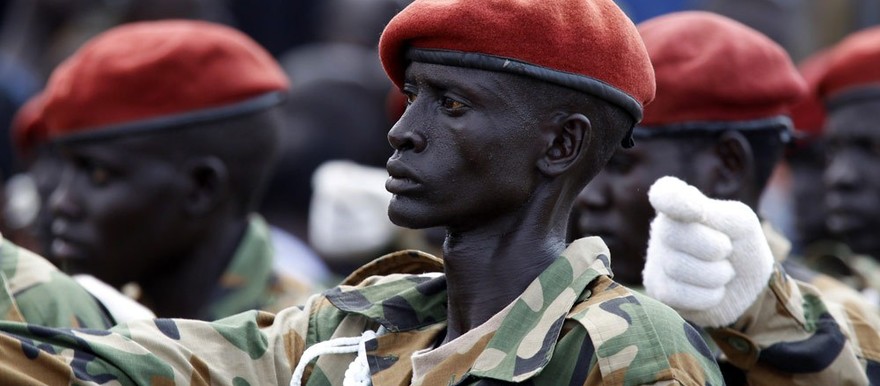South Sudanese officials and visiting dignitaries warned of food shortages and ‘dire economic straights’ in the year-old republic this Independence Day even as crowds gathered for speeches, marches and songs in celebration.
Popular fervour for independence in South Sudan found expression in a referendum in January 2011 resulting in a 98.8% vote for secession and the formal break-up of Sudan six months later. But one year on, once-productive oil wells lie stagnant, half of the population doesn’t have enough to eat, and illegal checkpoints and taxes have crippled trade into the interior.
“A year ago we joined the rest of the world in celebrating the birth of the new nation of South Sudan. Today in Juba, my mood is rather more sombre. The economy is in dire straits due in part to the government’s decision to shut down oil production,” said Archbishop Desmond Tutu, who leads the group of international dignitaries known as The Elders.
Sudan and South Sudan in the year since independence have failed to settle disputes over pipeline fees, arrears payments from the pre-independence revenue-sharing deal, and other oil-related issues.
An economy on the brink
There is little to compensate for the loss of oil revenues since much of South Sudan struggles with even subsistence-level agriculture. Fertile soils go untilled across much of the vast plains and forests of South Sudan. During the civil war years of exile many villagers grew dependent on aid hand-outs and even forgot how to cultivate. Parts of the countryside are still violent or inaccessible, lacking roads and services. This has aggravated rapid and poorly managed urban growth in Juba and state capitals.
President Salva Kiir in his address today conceded that more needs to be done to fight corruption and decrease aid dependency. The government’s once-bloated coffers are rapidly diminishing as the oil pipelines remain dry. Powerful government patrons who siphoned billions of dollars to business or clan networks will no longer enjoy the same revenues unless a deal can be reached on the oil. The president and a high-level austerity board are also pursuing closer scrutiny of spending.
“The President’s own estimation of losses due to corruption is truly shocking,” said Archbishop Tutu.
In the Upper Nile region, where heavy rains feed lush native vegetation this time of year, 110,000 registered refugees from Blue Nile rely on food aid. Refugees and native villagers alike face staggeringly high levels of malnutrition among their children. John Juma, who leads the county government in the Maban area of Upper Nile, issued an independence-day message over Radio Tamazuj calling on his fellow citizens to cultivate and urged the refugees from Blue Nile to join in.
The commissioner pointed out that even common Sudanese foods such as rijla, khodra and bamiya are not available in the local market because of severed trade routes and failure on the part of farmers to cultivate and bring goods to market.
War at the borders
The South’s conflict with its northern neighbour has also had frightful consequences in South Kordofan state, which belongs to Sudan but is largely controlled by allies of the Southern government. A woman in the town of Kauda told Radio Tamazuj: ‘We farmed this year but not much, just little gardens like you can see here. We couldn’t work the far farms (those beneath the hills) because we were afraid of airplanes and the like.’
International diplomats and dignitaries are urging Khartoum and Juba to resolve their differences by 2 August, a deadline set by the UN Security Council. Mary Robinson, former president of Ireland and a member of The Elders, said from Juba on Friday that the delegation would visit Khartoum this week.
She said they would “urge the leaders of both countries to realise their interdependence and put the welfare of their people first, particularly women and children, who are most vulnerable in times of economic hardship and war.”
The United Nations, however, marked the day with a positive message. Secretary-General Ban Ki-moon, whose written remarks were read to the crowd in Juba by his representative Hilde Johnson, said South Sudan’s people have made “tremendous sacrifices” and can now “proudly walk the world stage.”
Last May the United Nations appealed to its member states to provide more than US $500 million for emergency humanitarian aid in South Sudan. The UN agencies estimated that 4.7 million people are food insecure this year.




